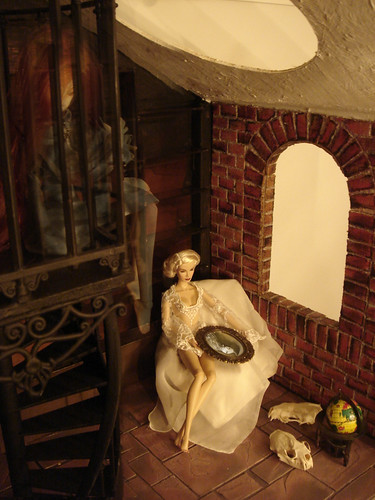Night of Hallows
"Halloween is a time that reconfirms the social bond of a neighborhood (particularly the bond between strangers of different generations) by a ritual act of trade. Children go to lengths to dress up and overcome their fear of strangers in exchange for candy. And adults buy the candy and overcome their distrust of strange children in exchange for the pleasure of seeing their wild outfits and vicariously reliving their own adventures as children". (Richard Seltzer, "Why Bother to Save Halloween")
It took me no less than 11 years to start to slightly enjoy or even remotely appreciate Halloween. The notion of celebrating death is very foreign to me and how I grew up, and the scary and gruesome imagery of the modern incarnation of the holidays are off-putting to say the least. The Real Origins of Halloween make more sense of this special holiday and shed some light on the issues surrounding this holiday and how it is celebrated today. Perhaps we all need a little scare to bring us back to full life.
Death is really part of life. And because we live in such a sterile, generational-segregated society, death seems a lot more foreign and unknown and therefore even more frightening than it ever was before. Halloween seems to be an exceptional occasion where we can deal with our fears. But what is death is not scary at all? What if it is really part of life? What if we can communicate with the dead, our dearly departed ones who seemingly left our lives forever?
According to various pagan traditions around the world, it is possible to communicate and connect with the dead. For example, most people in Japan do this every day, burning incense in home shrines for the ancestors. And they are not the only ones. It is interesting that incense smoke or perfume is incorporated into different techniques of inviting the dead and the spirits to communicate.
Halloween is the best time of the year to do so, as the barriers between the world of the living and the world of the dead are thin and it is easier to travel in both directions. Spirits of the dead can visit our world and vice verse.
"And the clothes you left, they lie on the floor
And they smell just like you (...)" (Avril Lavigne, "When You're Gone")
We become greatly attached to the scent of our family members, friends and lovers. When we smell their favourite food or perfume or cologne, we immediately think of them or can even sense their presence. This is because the sense of smell has a direct connection to the part of the brain that processes emotions. Our smelling organ (the olfactory bulbs) are in fact part of the brain. And when a person leaves our life - because of death or other reason - it is usually their smell that we miss the most. With the absence of the person, their unique smell dissipates and there's no way to bring it back. Or is there?
People who were visited by the spirit or soul of a loved one have witnessed a familiar scent - a perfume or aroma that the person loved in their life in this world. The Mexicans, for example, burn copal resin as incense to attract the spirits of the dead, and also for protection. Rituals from around the world designed to invoke spirits of the dead often include burning incense. Incense has a powerful impact on the psyche - incense and agarwood, for example, both bring a person into a meditative state of mind. And also, the thick smoke from the incense served as a stage for the shaman/witches' imagination. Burnt incense, similarly to their essential oils, are mostly heavy "base notes". Resins and gums such as frankincense, galbanum, myrrh, opoponax and more. And since theyr contain a high percentage of essential oils, they really come out clearly over the embers or charcoal, even more so than the precious woods (sandalwood, agarwood). Considering that in ancient times, the alchemists believed essential oils to be the spirit of the plant, it is not surprising that these very same resins are to this day used for increasing spiritual awareness, and perhaps even communicates with other spirits than our own.
HAPPY HALLOWEEN!
Labels: Day of the Dead, Halloween, samhain




0 Comments:
Post a Comment
<< Home